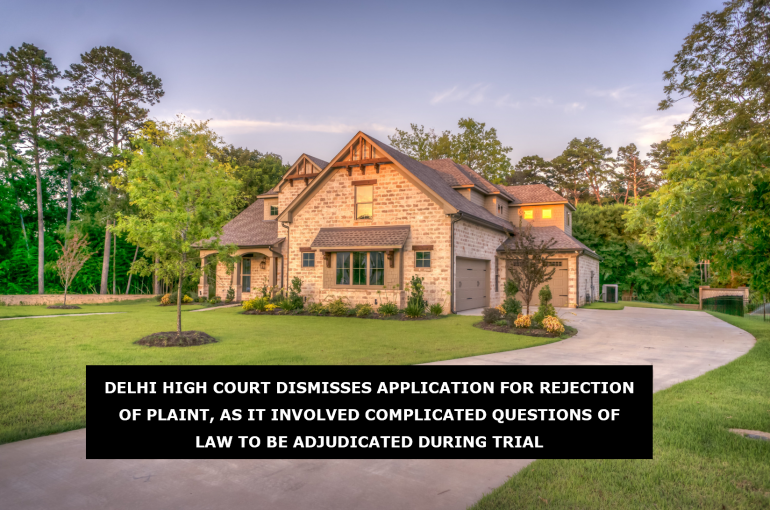DELHI HIGH COURT DISMISSES APPLICATION FOR REJECTION OF PLAINT, AS IT INVOLVED COMPLICATED QUESTIONS OF LAW TO BE ADJUDICATED DURING TRIAL
In a recent case of Sara Carriere Dubey Vs Ashish Dubey, CM(M) 371 / 2022 and CM APPL. 39340 / 2023, Hon’ble Mr. Justice Navin Chawla of the Delhi High Court passed a Judgment dated 17-10-2023 and dismissed an application seeking rejection of plaint, as the matter involved complex issues of law, that had to be adjudicated during trial of the suit.
Facts
i) In the present case, the Respondent-Ashish Dubey had filed a Suit bearing CS No. 21 / 09 before the Ld. Principal Judge, Family Courts, South District, Saket Courts, New Delhi (Trial Court) seeking a decree of partition, possession and injunction of the Property bearing No. 299, Ganpat Andalkar Block, Asian Games Village, Khel Gaon Marg, New Delhi (Suit Property). The said Suit Property was in the joint name of the Respondent-Plaintiff and his wife, Sara Carriere Dubey i.e. the Petitioner-Defendant since around 21-08-2008. However, owing to certain matrimonial disputes between the parties and a divorce petition filed by the Plaintiff, the Plaintiff sought for partition of the Suit Property.
ii) The Defendant filed an Application under Order VII Rule 11 of Code of Civil Procedure, 1908 (CPC) (Rejection of plaint) seeking rejection of the Plaint filed by the Plaintiff on the ground that the Plaintiff being a ‘joint’ owner of the Suit Property cannot claim partition thereof.
iii) The Trial Court, vide Order dated 24-03-2022, dismissed the Application filed by the Defendant seeking rejection of the Plaint.
iv) Aggrieved by the Trial Court Order dated 24-03-2022, the Defendant-Wife filed a Civil Miscellaneous Petition in CM(M) 371 / 2022 before the Delhi High Court.
High Court Observations
The High Court, vide Order dated 17-10-2023, made the following observations:
1) That for considering an application for rejection of plaint filed under Order VII Rule 11 of CPC[1], the Court has to only take into account the averments made in the plaint and documents filed with such plaint alone and not the following factors:
(a) the defense raised by the defendant in the written statement,
(b) evidence,
(c) issues on merits of the matter that may arise between the parties,
(d) complex / disputed questions of facts or law or mixed questions of law and fact.
As consideration of the aforementioned factors may require examination of plaint and other evidence, which cannot be allowed at the stage of considering an application for rejection of plaint under Order VII Rule 11 of CPC.
2) Further, “in the event, the jurisdiction of the court is found to be barred by any law, meaning thereby, the subject-matter thereof, the application for rejection of plaint should be entertained.”
3) But this case involved complex questions of law inter alia whether the law prohibits a joint owner i.e. Plaintiff-Husband from seeking partition of the Suit Property solely because the other joint owner i.e. Defendant-Wife is his spouse. The High Court has in earlier cases held that while considering an application for rejection of plaint under Order VII Rule 11 of CPC, the Court need not make an elaborate inquiry into doubtful or complex questions of law, rather restrict to the averments made in the plaint and documents filed therewith. Hence, the Defendant’s Application for Rejection of Plaint cannot be allowed, as the case involved complicated questions of law.
Conclusion
Thus, based on the aforesaid observations, the Delhi High Court dismissed the Petition filed by the Defendant-Wife seeking rejection of the Plaint, as the case involved complex issues of law, that would require adjudication during the trial of the Suit. As a result, the Trial Court Order dated 24-03-2022 dismissing the Application for rejection of Plaint filed by the Defendant-Wife, was upheld.
Harini Daliparthy
Senior Associate
The Indian Lawyer
[1] Order VII Rule 11 of CPC: Rejection of plaint
The plaint shall be rejected in the following cases:—
(a) where it does not disclose a cause of action;
(b) where the relief claimed is undervalued, and the plaintiff, on being required by the Court to correct the valuation within a time to be fixed by the Court, fails to do so;
(c) where the relief claimed is properly valued, but the plaint is returned upon paper insufficiently stamped, and the plaintiff, on being required by the Court to supply the requisite stamp-paper within a time to be fixed by the Court, fails to do so;
(d) where the suit appears from the statement in the plaint to be barred by any law;
(e) where it is not filed in duplicate;
(f) where the plaintiff fails to comply with the provisions of rule 9:
Provided that the time fixed by the Court for the correction of the valuation or supplying of the requisite stamp-paper shall not be extended unless the Court, for reasons to be recorded, is satisfied that the plaintiff was prevented by any cause of an exceptional nature from correcting the valuation or supplying the requisite stamp-paper, as the case may be, within the time fixed by the Court and that refusal to extend such time would cause grave injustice to the plaintiff.





































Leave a Reply